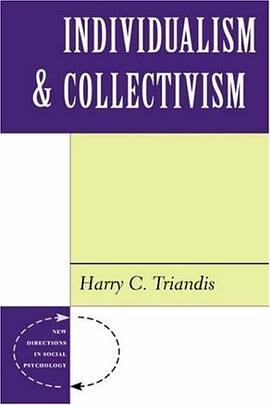

具体描述
"This major work represents the culmination of studies, extending over some twenty-five years; beginning with the study of "authoritarianism" and dogmatism, the investigations have led into generic problems of the organization and change of attitudes, beliefs, and values" (Williams and Rokeach, 1974).
Williams, R. M. and Rokeach, M. (1974) ‘The Nature of Human Values.’, Political Science Quarterly, 89(2), doi: 10.2307/2149267
作者简介
Milton Rokeach (born in Hrubieszów as Mendel Rokicz, December 27, 1918 – October 25, 1988) was a Polish-American social psychologist. He taught at Michigan State University, the University of Western Ontario, Washington State University, and the University of Southern California. A Review of General Psychology survey, published in 2002, ranked Rokeach as the 85th most cited psychologist of the 20th century.--Form Wiki Pedia
目录信息
1. THE NATURE OF HUMAN VALUES AND VALUE SYSTEMS
The nature of values
The nature of value systems
Functions of values and values systems
Values distinguished from other concepts
Antecedents and consequences of values and values systems
Toward a classification of human values
Summary
2. THE MEASUREMENT OF VALUES AND VALUE SYSTEMS
The value survey
Value measures
Order effects
Social desirability
The structure of values
Values as indicators of needs
The meaning of values
Concluding comments on the measurement of values
PART TWO Values in American Society
3. VALUES AS SOCIAL INDICATORS OF THE QUALITY OF LIFE IN AMERICA
Values of American men and women
Social class values: Income and education
Values and race
Age differences in values
Religious Values
Political Values
Some cross-cultural comparisons
Concluding remarks
4. VALUES AND ATTITUDES
Civil right for black and poor Americans
Student protest
International affairs
Religion
Personality
Inconsequential attitudes
Discussion
5. VALUES AND BEHAVIOR
Civil rights
Religion
Politics
The Vietnam war
Honest and dishonest behavior
Interpersonal conflict
Behavior in the counseling situation
Academic pursuits
Life style
Occupational roles and choices
Discussion
PART THREE Values and Politics
6. A TWO-VALUE MODEL OF POLITICAL IDEOLOGY
Procedure
Terminal value differences among the four ideologies
Instrumental value differences among the four ideologies
A blind replication
Additional evidence for the two-value model
Discussion
Some alternative interpretations
Concluding comment
7. SOME IMPLICATIONS OF THE TWO-VALUE MODEL OF POLITICS
Equality-Freedom orientations as ideological predispositions
A law of political activism
PART FOUR Long-and Short-term Change in Values, Attitudes, and Behavior
8 A THEORY OF COGNITIVE AND BEHAVIORAL CHANGE
A matrix of possible contradictions within the total belief system
The nature of cognitive inconsistency
Self-dissatisfaction as a determinant of change
Determinants of self-dissatisfaction
Modes of reducing self-dissatisfaction
Major differences between the present theory and other balance theories
9 PROCEDURES FOR INDUCING AND ASSESSING LONG-TERM CHANGE
General procedure
The three experiments
The subjects
The measurements
Pretest, treatment, and posttest procedures
Postexperimental interviews
Debriefing and feedback procedures
10. LONG-TERM AND ATTITUDE CHANGE
Pretest comparisons of experimental and control groups
Long-term changes in equality and freedom
Long-term changes in other values
Long-term value system changes
Long-term attitude change
Temporal sequence of value and attitude change
Value and attitude changes in various experimental sugroups
Effects of Value change on attitude change
11. LONG-TERM BEHAVIORAL CHANGE
Behavioral responses to NAACP solicitations
Stated preferences and registrations in ethnic core courses
Dropouts and transfers
Summary
12. THE PROCESS OF CHANGE
Effects of contradiction on self-dissatisfaction
Effects of specific self-dissatisfaction on value change
Effects of general self-dissatisfaction and hypocrisy
Affective, cognitive and personality variables that did not affect the change process
Postexperimental interviews concerning the change process
Other experimental investigations of the change process
Pot hoc explanation of unexpected findings
13. SOME ALTERNATIVE INTERPRETTIONS
Methodological considerations
Statistical considerations
Substantive considerations
PART FIVE Summary
14 IMPLICATIONS FOR THE BEHAVIORAL SCIENCES AND FOR SOCIETY
Methodological implications
Theoretical implications
Practical implications
Practical implications
Ethical implications
A concluding philosophical comment
REFERENCES
APPENDIX A: The Rokeach Value Survey
APPENDIX B: Frequency Distributions of 18 Terminal and 18 Instrumental Values for National NORC Sample Tested in 1968, by Sex, Income, Education, Race, Age, and Religion
APPENDIX C: The value Change Instrument
INDEX
· · · · · · (收起)
读后感
评分
评分
评分
评分
用户评价
这是一部需要反复翻阅的书,因为它的每一章都像是一个知识的结晶体,密度极大。我特别赞赏作者的写作风格——它有一种冷静的、近乎于人类学家的客观性,却又不失对人类困境的深切同情。它没有使用任何花哨的修辞手法,语言是极其克制的,每一个句子都承载着明确的信息量。我花了好几天时间才消化完关于“价值层级固化”的那一节,它解释了为什么一些人似乎永远无法摆脱某种生活模式,即便他们口头上宣称想要改变。这种内在的、难以撼动的价值秩序,才是真正的“命运”。这本书更像是一份精密的“人类行为使用说明书”,它并没有教你如何成为一个“好人”,而是帮你理解“为什么你会是你现在这个样子”。对于任何试图理解复杂社会现象背后驱动力的思考者来说,这本书都是不可或缺的基石。
评分这本书的独到之处,在于其对“无意识价值”的挖掘。我们常常以为自己的选择是基于理性计算的,但作者通过一系列心理学实验和历史案例的交叉对比,有力地证明了,我们绝大多数的价值取向,是在我们尚未具备完全自我意识的童年或集体认同的过程中被“植入”的。这种“植入”机制,决定了我们后半生的许多取舍。我个人认为,书中关于“价值冲突”的处理尤其精彩,它没有简单地将冲突归咎于“邪恶”或“错误”,而是将其视为人类认知结构中不可避免的张力体现。例如,对“效率”与“公平”之间永恒的拉锯战的描述,就极具穿透力。我读完后,对那些看似坚不可摧的社会规范,产生了一种健康的怀疑——它们真的是最好的选择,还是仅仅是历史遗留下来的、效率最高的价值打包方案?这本书的价值,就在于它教会我们如何质疑那些“不言自明”的真理。
评分这本书简直是场思维的马拉松,读完后我感觉自己对“价值”这个概念的理解被彻底颠覆了。作者并没有像某些哲学书籍那样故作高深地堆砌晦涩难懂的术语,而是用一种近乎外科手术般精准的笔触,将人类决策背后那些潜藏的、幽微的驱动力层层剥开。尤其令我印象深刻的是其中关于“自我实现”与“社会契约”之间微妙张力的探讨。书中通过一系列看似毫不相干的案例分析,比如某个历史事件的转折点,或者日常生活中一次微不足道的选择,巧妙地揭示了我们是如何在集体期望与内在渴望之间进行永恒的权衡。我尤其欣赏作者避免了绝对化的论断,承认了价值体系的流变性和情境依赖性。读这本书的过程,更像是一场与自己内心深处的对话,它迫使你审视那些你习以为常却从未深思过的“为什么”。它不是一本教你“应该如何”的书,而是一本让你“看到如何”的书,这种洞察力是极其珍贵的。它不提供简单的答案,而是提供了一套更精细的分析工具,去拆解那些塑造我们行为模式的无形力量。
评分坦白说,这本书的开篇略显学术化,需要读者投入一定的精力去适应作者构建的理论框架,但一旦跨过那道门槛,后面的阅读体验便如履薄冰般的流畅与令人振奋。它最成功的地方在于,它将“价值”这个常常被哲学和伦理学垄断的概念,拉回到了日常的、经验性的层面。书中关于“延迟满足”与“即时回报”的案例分析,简直就是对现代消费主义社会的一次精准解剖。我感觉自己仿佛拿到了一把瑞士军刀,可以用来拆解生活中的各种权衡:职业选择、亲密关系中的付出与索取,甚至是我们如何分配我们的闲暇时间,背后都遵循着一套可被探究的价值逻辑。这种对日常的深刻反思,使得阅读过程充满了“顿悟”的瞬间。它不贩卖鸡汤式的积极性,而是提供了一种更深层次的、更具批判性的自我认知工具,让人在面对选择时,能更清晰地辨识出哪些是真正的自我驱动,哪些只是外部的噪音。
评分这部作品的叙事节奏把握得极好,它不是那种让你一口气读完就束之高阁的畅销书,而是需要细细品味的、带有实验性质的文本。作者似乎拥有一种罕见的平衡感,既能深入到最细微的心理层面,探讨个体偏好的形成机制,又能宏观地将其置于社会结构和文化变迁的大背景下进行考察。我特别喜欢作者在处理跨文化差异时的那种谦逊和严谨,他没有急于将西方的主流价值体系作为普适的标尺,而是耐心地描摹了不同文明在衡量“善”与“美”时的独特路径。书中的图表和模型运用得恰到好处,它们不是为了炫技,而是为了具象化那些抽象的概念,让读者能够“看见”价值的流向。读罢此书,我发现自己对新闻报道中那些充满价值判断的言论,多了一层审视的滤镜——我开始追问,驱动这些观点的底层价值锚点究竟是什么?这本厚重的著作,实际上是一次对人类心智地图的精妙绘制。
评分 评分 评分 评分 评分相关图书
本站所有内容均为互联网搜索引擎提供的公开搜索信息,本站不存储任何数据与内容,任何内容与数据均与本站无关,如有需要请联系相关搜索引擎包括但不限于百度,google,bing,sogou 等
© 2026 book.quotespace.org All Rights Reserved. 小美书屋 版权所有




















